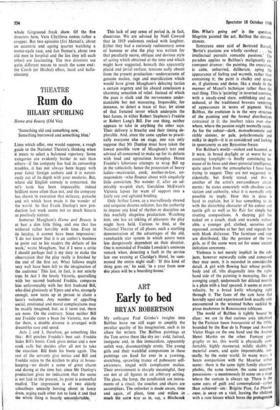Home and Beauty (Old Vic)
THEATRE
Rum do
HILARY SPURLING
'Something old and something new, Something borrowed and something blue.'
Lines which offer, one would suppose, a rough guide to the National Theatre's, thinking when it meets to select a balanced repertory. Some categories are evidently harder to suit than others—if the company has had its censorship troubles, it has not always been happy with your fancy foreign authors and it is notori- ously out of its depth with your moderns. But, where old English comedy is concerned, the brr's taste has been impeccable, indeed brilliant more often than not, and the company has shown in execution that delicacy, panache and wit which have made it the wonder of the world. So that Frank Dunlop's new pro- duction last week seems not so much bizarre as positively sinister. .
Somerset Maugham's Home and Beauty is at best a dim little thing, and one that has withered rather horribly with time. Even in its heyday, it cannot have been impressive: 'I do not know that it is an author's business to point out to his readers the defects of his work,' wrote Maugham, `but if I were a critic I should perhaps feel it my duty to make the observation that the play really is finished by the end of the first act. What follows might very well have been left to the imagination of the audience.' This last, in fact, is not strictly true. In Act 1 the lovely Victoria, quarrelling with her second husband Freddie, compares him unfavourably with her first husband Bill, who died gloriously at Ypres and who, strangely enough, now turns up in person to claim a hero's welcome. Any number of appalling social, emotional and moral complications may be readily imagined, but, as it turns out, there are none. On the contrary. Since neither Bill nor Freddie cares a bean for Victoria, nor she for them, a double divorce is arranged with dreamlike ease and speed.
Acts 2 and 3, therefore, go something like this: Bill pinches Freddie's best suit. Freddie hides Bill's boots. Cook gives notice and a new cook calls but decides after all not to take the situation. Bill finds his boots again. The rest of the servants give notice and Bill and Freddie retire to the kitchen to play at house- keeping—no doubt a scene of great charm and daring at the time but, since Mr Dunlop's production gives no indication that the scene is not laid in the present, its point is somewhat muffed. The impression is of two elderly schoolboys uneasily horsing about in fancy dress, urging each other not to funk it and that the whole thing is beastly uncomkortable:
This lack of any, sense of period is, in fact, disastrous. We are advised by Noel Coward that in 1919 audiences rocked with laughter. Either they had a curiously rudimentary sense of humour or else the play was written for that peculiarly suave, oblique and devious style of acting which obtained at the time and which might have suggested, beneath this apparently placid and jovial surface, tensions sadly absent from the present production—undercurrents of genuine malice, rage and mortification which would have given Maugham's delaying tactics a certain urgency and his absurd conclusion a charming sensation of relief. Instead of which the pace is slack and the nervousness under- standable but not reassuring. Impossible, for instance, to detect a trace of fear, let alone of that frenzied terror which underpins the best farces, in either Robert Stephens's Freddie or Robert Lang's Bill. For one thing, neither appears to take in anything the other says. Their delivery is breathy and their timing de- plorable. And, since the same applies to practi- cally everyone else on stage, one can only suppose that Mr Dunlop must have taken the lowest possible view of Maugham's text and advised all concerned to make up for its defects with loud and uproarious horseplay. Hence Freddie's laborious attempts to wrap Bill up in the tablecloth; hence the procession of heavy ladies—manicurist, cook, mother-in-law, co- respondent—who flounce about with singularly little conviction. No wonder if, after an ad- mirably waspish start, Geraldine McEwan's Victoria lapses for want of support into a fairly coy and agitated bridling.
Only Arthur Lowe, as a marvellously shrewd and sanguine divorce solicitor, has the authority to impose any kind of rhythm or discipline on this woefully shapeless production. Watching him, one has an inkling of pleasures the play might have held. Curious to find, at the National Theatre of all places, such a startling demonstration of the advantages of the old, ramshackle star system in which actors were less dangerously dependent on their director. One is reminded of Freddie Lonsdale's ominous remark when, detecting a fault in the service late one evening at Claridge's Hotel, he sum- moned the entire night staff : 'If this kind of thing goes on,' he said, 'in a year from now this place will be a boarding-house.'






































 Previous page
Previous page